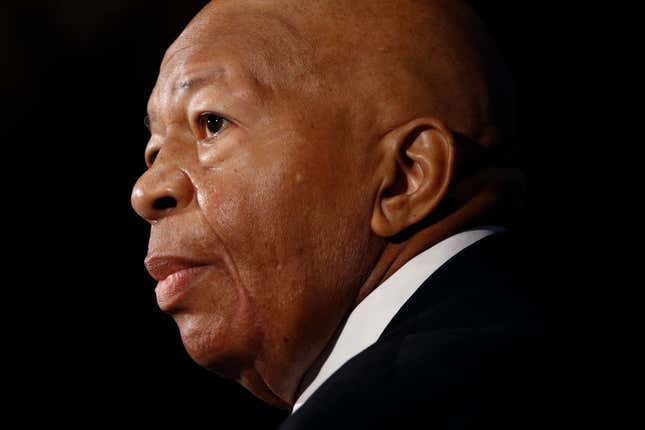
“Donald, EEC passed away.”
That was the text message I got from my friend and former colleague just before 6 a.m. on Oct. 17, 2019, alerting me that my former boss, Rep. Elijah E. Cummings, had succumbed to longstanding health challenges just 10 months into his tenure as chairman of the House Committee on Oversight and Reform. After taking some time to gather myself, and sending and replying to various messages of support, I got ready for work. As I dressed in front of the mirror that day, I recalled how years earlier, Chairman Cummings chastised me about my crooked shirt collar during a committee hearing. And then he gave me a set of permanent collar stays to take home. In this way, and many others, he is with me every day.
Chairman Cummings hired me in January 2011, when he became the Ranking Democrat on the Oversight Committee. I distinctly remember how, during my interview, he looked up from my resumé and asked whether I was “tough enough” for the grueling work that lay ahead. Under his leadership during the next four years, I investigated firearms trafficking at the southern border and Department of Energy loan guarantees. I organized forums on college affordability and criminal justice reform. I hope that I met his challenge. More importantly, I‘m grateful for the opportunity to have learned from a man who embodied public service.
He prepared thoroughly for mundane hearings that many of his colleagues skipped. He demanded that we pursue government corruption and “follow the facts” regardless of politics. And he routinely used his platform to promote a better future for “generations yet unborn” in his native Baltimore and beyond. Because of this experience, I was not shocked to hear that the Chairman worked until the day he died, personally signing subpoenas from his hospital bed. Now, it’s clear that Chairman Cummings is setting an example even after he is gone.
Last week, the Baltimore Sun reported that Chairman Cummings’ campaign committee had more than $1 million in unspent funds remaining and that he wanted those funds “donated to youth programs, such as those helping needy students pay for college.” The chairman’s campaign treasurer said that after “winding down operations” any excess campaign funds “will be transferred to educational and charitable organizations for the purpose of need-based college scholarships and youth leadership programs.”
On the wall of my office is a handwritten note that Chairman Cummings signed on my last day working for the Oversight Committee. It reads: “Thank you for just being you. I truly appreciate all you have done to make my journey easier.” Through his work and his example, Chairman Cummings has made life’s journey easier for me, my colleagues, and countless others. The decision to fund youth education with his unspent campaign dollars is another example of his commitment to future generations.
My current work as a government ethics lawyer at Citizens for Responsibility and Ethics in Washington (CREW) illuminates just how “unusual” Chairman Cummings’ act of generosity is. Federal law allows the campaign committees of deceased or former members “broad discretion on how to spend money” and reports indicate that several have used “old campaign accounts to lobby on behalf of foreign clients.” We’ve seen retiring members of Congress spend leftover campaign funds on all kinds of personal extravagances, including a 5-star hotel stay, social club memberships, and baseball tickets. We’ve also seen questionable expenses from deceased members’ campaigns. Despite these trends, it’s no surprise that Chairman Cummings chose a different path.
Throughout his career as a civil rights advocate, attorney, and legislator, Chairman Cummings made promoting ethics and integrity in our democracy a priority. One of Cummings’ last acts before I left his Oversight Committee staff in 2015 was to request a review of problems posed by outdated voting machine technology. After assuming the chairmanship in 2019, one of Cummings’ first acts was to convene a hearing on a historic government ethics reform bill supported by CREW and other good government groups. That was one of Elijah Cummings’ most admirable qualities—regardless of his position or standing, he remained a fierce champion for democratic institutions.
Following the chairman’s passing, numerous tributes referenced his impassioned speech from Michael Cohen’s public testimony before Congress. Cummings’ voice boomed, “When we’re dancing with the angels, the question we’ll be asked: In 2019, what did we do to make sure we kept our democracy intact?” As we continue to grapple with the mortality of Chairman Cummings and other leaders committed to justice and ethics in America, we must also step forward to advance their cause. Without a doubt, the question will be asked again: “In 2020, what did we do to make sure we kept our democracy intact?” That work now lies with us. We must be tough enough to take it on.
Donald K. Sherman serves as deputy director at Citizens for Responsibility and Ethics in Washington (CREW). Prior to joining CREW, he worked as an oversight and ethics lawyer in the House, Senate and the Obama administration, including as chief oversight counsel to Rep. Elijah E. Cummings on the House Oversight Committee. You can follow him on Twitter.

